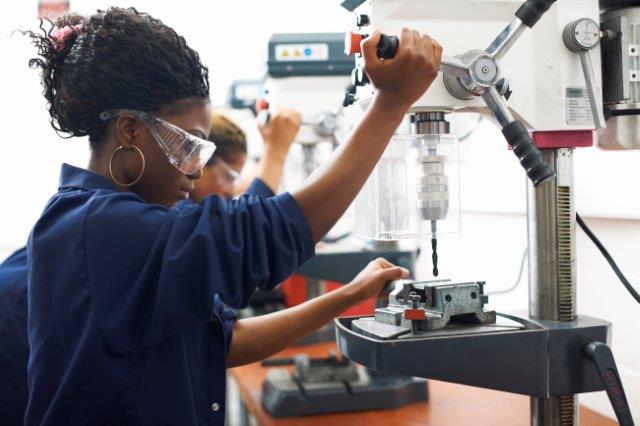It’s full steam ahead for leading South African NGO, PROTEC, as it prepares to launch GE’s inaugural Next Engineers – a global further education readiness programme – to the first cohort of 750 high school students across Johannesburg in early 2022, in a mission to inspire the next generation of engineers: the innovators, problem-solvers, and leaders of tomorrow.
PROTEC has been providing impactful educational support for successful STEM careers to disadvantaged high school students since 1982, and was selected by the GE Foundation through FHI 360 in mid-2021 as the South African NGO best equipped to be the lead implementation partner in their goal to grow the pool and diversity of engineers in the country.
Applications are open until 21 January 2022 to students in all high schools in Johannesburg’s five educational districts – central, east, west, south, and north – to participate in one of the three programmes that will be run for different age groups.
- Engineering Discovery will accommodate 500 Grade 8 students, aged 13-14 years, and 200 parents per year, over five years, and will be run in selected schools throughout the year, primarily on Saturdays. The aim will be to build awareness and expand understanding of the work that engineers do through exploratory sessions. Volunteers will be involved, delivering creative, hands-on activities to inspire the young people about the wide world of engineering.
- Engineering Camp, for Grade 9 students, aged 14-15, will accommodate 200 students per year, in a week-long camp at a university in Johannesburg during the June/July school holidays. Here students will be immersed in the engineering process, interacting with experienced engineering faculty staff and business leaders and completing design challenges inspired by real-world scenarios, as they begin to build their own identities as aspiring engineers.
- Engineering Academy, for grades 10-12 students, aged 15-18, will accommodate 50 students per year in three cycles over five years, in classes and workshops also held at a university in Johannesburg, mainly on Saturdays. Here students will learn to think and act like engineers and prepare for tertiary education. Their activities include immersive design challenges, career coaching, and workshops, which will equip the students with skills needed for successful careers in engineering. Successful learners who enrol for engineering careers after matric will also qualify for an academic scholarship from the GE Foundation.
GE’s Next Engineers programme launched in October 2021 in four cities – one in the UK, two in USA, and one in Africa, in Johannesburg – and will expand to 25 cities, reaching over 85 000 students by 2030. GE has committed up to R40 billion to inspire more than 3 500 Johannesburg students aged 13-18, providing first-hand experiences in engineering and awarding financial support to pursue further education in engineering.
Balan Moodley, PROTEC’s CEO, is thrilled at the opportunity to partner with GE and FHI 360 in this exceptional project that will go a long way towards redressing the imbalances of the past, particularly in relation to the low number of women in engineering. He says that the international benchmark of an average population per engineer shows that South Africa lags far behind other countries, with one engineer per 3 166 people, whereas a country such as Brazil has one engineer per 227 people. “South Africa is severely under-engineered, and this programme promises to go some way towards providing a sustainable solution that addresses the dire skills shortage across engineering disciplines, locally and internationally.”
The GE Next Engineers programme is perfectly aligned to the PROTEC’s foundational objective when it was established 40 years ago in Soweto by a group of concerned engineers from the SA Institute of Civil Engineers (SAICE). The vision for PROTEC was to help high school children in disadvantaged communities prepare for successful careers in sciences, technology, engineering, and mathematics. “The legacy of PROTEC’s founders has been strengthened with this potentially impactful programme – and PROTEC is proud to build on it,” adds Moodley.
The Next Engineers programme will be coordinated by Luyanda Mamane, a PROTEC alumnus and a qualified Aeronautical Engineer from Wits University, as the project manager reporting to the PROTEC Senior Project Manager, Duduzile Ngoepe. Programme facilitators will primarily be sourced from volunteers from GE South Africa’s network of engineers, Wits University, and the PROTEC Alumni, who have long been involved in PROTEC’s STEM educational programme.
The course content is open ended, with a key focus on current social challenges such as water, electricity, poverty, the current pandemic, and issues related to the Fourth Industrial Revolution environment. Measurement and evaluation will be consistent throughout the programme and will assess full participation and commitment by students and parents, and the uptake of engineering studies in tertiary institutions and successful engineering careers.
Nyimpini Mabunda, GE South Africa’s CEO, says engineers are needed to solve a myriad of challenges such as sustainable flight, quality healthcare, and clean energy. “Our Next Engineers programme will help us expose students to the wide-ranging opportunities that engineering offers through hands-on learning. Not only does GE believe in the continuous development of the company and its employees, but it remains committed toward bridging the critical gap in STEM skills in South Africa. Through Next Engineers, students will be empowered to develop the skills they need to build a world that works.”
Alison Bengston, Gauteng Department of Education’s (GDE) DDG Curriculum Support, says the programme has come at the most opportune time as the GDE is busy reorganising schools in line with the Schools of Specialisation programme in Gauteng. “This aligns very well with the ideals and objectives of the department in redressing the imbalances of the past and also as a pipeline into the engineering sector.”
For more information, visit www.protec.org.za and www.nextengineers.org

